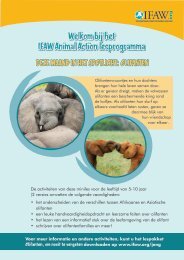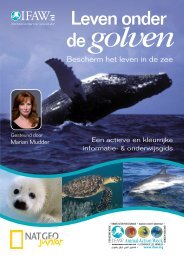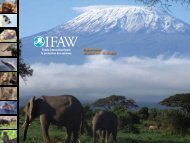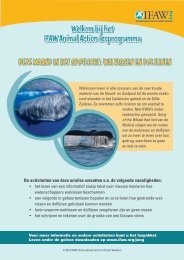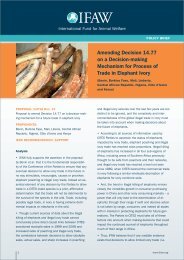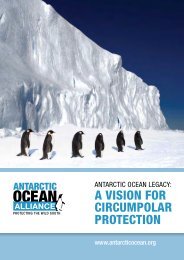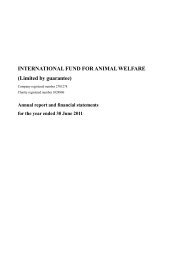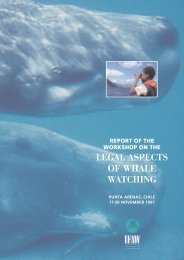Whale Watching Worldwide
Whale Watching Worldwide
Whale Watching Worldwide
Create successful ePaper yourself
Turn your PDF publications into a flip-book with our unique Google optimized e-Paper software.
Local Case Study: Dominica<br />
According to apocryphal legend, when Christopher Columbus was asked to describe the island he had<br />
named after the day of the week upon which he encountered it – Dominica – he roughly crumpled a piece of<br />
parchment and tossed it upon the table, indicating its mountainous nature and absence of flat land.<br />
Indeed, the youngest island of the lesser Antilles, Dominica is still in the process of being formed by volcanic<br />
activity as may be seen with its famous boiling lake – the second largest hot spring in the world. The<br />
resultant vertical topography, reflected in the pre‐Columbian indigenous Carib name for the island – ‘Wai'tu<br />
kubuli’, meaning ‘Tall is her Body’ ‐ served to limit cultivation and development of the landscape during the<br />
intermittent British Colonial era and consequently Dominica boasts a greater proportion of pristine<br />
rainforest wilderness than its more developed neighbours, affording it the unofficial title of the ‘Nature Isle<br />
of the Caribbean’.<br />
This same topography continues underwater in the sea surrounding the islands, creating deep ocean<br />
trenches close to shore which, combined with the warm, sheltered waters of the island’s west coast, make<br />
this ideal cetacean territory.<br />
Whilst running dive tours for the Anchorage Hotel, Fitzroy Armour began noticing the interest divers showed<br />
in the whales sighted which, combined with Fitzroy’s own interest in these animals as a naturalist and<br />
photographer, led him to begin whale watching tours in 1988. Some five years later Derrek Perryman and<br />
Captain Billy Lawrence became interested in the promise of whale watching and began including it in some<br />
of their diving packages, and in 1995 the company for which they worked, Dive Dominica, began its first<br />
commercial whale watching tours.<br />
Today, Dominica has one of the largest boat‐based commercial whale watching industries in the Caribbean,<br />
taking nearly 15,000 tourists in 2008. Along with St Lucia, the Dominican Republic and Puerto Rico, it has<br />
firmly established whale watching as a significant tourist attraction in the region.<br />
The industry has been proactive in its self‐management in a manner not frequently seen, but is likely to be a<br />
partial reason for its continuing success as it has a unique ability to provide a quality tourism experience.<br />
As noted by Hoyt (1999), the development of the whale watching industry in Dominica has maintained a<br />
strong emphasis upon education and conservation, with multiple workshops between operators, scientists<br />
and government officials, including the close involvement of IFAW.<br />
In the absence of laws regulating whale watching, the Dominican operators have generally adopted and<br />
complied with their own modified system of international regulations which they have termed the Marine<br />
Mammal Code of Conduct. The Dominica Fisheries Division is, at the time of writing this report, in the<br />
process of developing regulations to formalise the good management of whale watching, which has been<br />
submitted to parliament.<br />
Although there are only four operators undertaking whale watch trips in Dominica, all are members of the<br />
pan‐Caribbean cooperative organisation, CARIBwhale. This industry association was founded in 2000 and<br />
formally incorporated in 2007 by over 15 whale watching organisations from various Caribbean nations in<br />
conjunction with IFAW. The organisation is dedicated to fostering an environment that will conserve<br />
cetaceans and their habitat, promoting responsible whale watching and support non‐invasive scientific<br />
research, education and community involvement.<br />
Such a strong commitment from the entire industry ensures a continuing high standard of whale watching in<br />
the country.<br />
249







